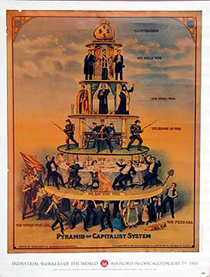When Robert 'Bob' Rubin Speaks ...
...Some people are listening anyway.
Came across this at Alternet, from The Nation by the highly respected William Greider, entitled Clinton Economists: A Storm Is Coming:
Economists from the Clinton era were once the biggest cheerleaders for free trade and pro-business policies -- but now economic uncertainties have them singing a different cheer.Greider, however, also reminds us to remember this about 'nice guys' like Rubin:
...it's a big deal when Robert Rubin changes the subject and begins to talk about income inequality as "a deeply troubling fact of American economic life" that threatens the trading system, even the stability of "capitalist, democratic society." More startling, Rubin now freely acknowledges what the American establishment for many years denied or dismissed as inconsequential--globalization's role in generating the thirty-year stagnation of US wages, squeezing middle-class families and below, while directing income growth mainly to the upper brackets.
A lot of Americans already knew this. Critics of "free trade" have been saying as much for years. But when Bob Rubin says it, his words can move politicians, if not financial markets.
... A strategy paper Rubin co-wrote defines the core problem: "Prosperity has neither trickled down nor rippled outward. Between 1973 and 2003, real GDP per capita in the United States increased 73 percent, while real median hourly compensation rose only 13 percent."
A storm is coming, Rubin fears. He wants a new national debate around these facts. In an interview, he explains the danger he foresees for global trade: "Where there's a great deal of insecurity, where median real wages are, roughly speaking, stagnant...where a recent Pew poll showed 55 percent of the American people think their kids will be worse off than they are, I think there is a real danger of heightened difficulty around issues that are already difficult, like trade.... Look at the difficulty around immigration."
Princeton economist Alan Blinder, a Hamilton participant and Federal Reserve vice chair in the Clinton years, describes the "difficulty" in more ominous terms: "I think the prospects for the liberal trade order are not great," he says. "There's a whole class of people who are smart, well educated and articulate, and politically involved who will not just sit there and take it" when their jobs are moved offshore. He thinks CNN commentator Lou Dobbs, who has built a populist following by attacking globalization and immigration, "is just the beginning -- nothing compared to what's going to happen in the future."
"The big difference separating him from the Progressives is that Rubin and his investment-banking colleagues are men of capital. ... I don't question his sincerity. But as a reformer, he has competing demands on his loyalty."And history has shown, money and power trump everything with those who have it and want to keep it at all costs.
For excellent proof, see David Sirota's thoughtful HuffPo apology and column entitled "MY APOLOGIES: Wash Post Exposes Real Agenda of Wall Street Dems" in which he
analyzes, responds to and (somewhat) disagrees with some of the implications and analysis of the truly excellent (and what Sirota calls 'stunning') WaPo piece by Steven Pealstein, "A Winning Strategy for the Democrats: Barter for Free Trade."
And by 'winning,' he means the reason democrats continue to lose elections -- because the party has lost not only its credibility, but its original populist, raison d'etre roots and I would again argue, its very SOUL.
And because these were Democrats, there were the requisite acknowledgements that, while trade is an overall plus for the economy, it has had some unpleasant side effects: insecurity about job losses, downward pressure on wages, widening inequality, and an unsustainable trade deficit.Sirota writes:
... the problem is that, when you scratch the surface, the free-trade members of the Democratic establishment turn out to be more committed to Part A of the formula, more globalization, than they are to Part B, making sure the benefits from globalization are widely shared. For them, it's really not a package deal. And if push comes to shove, which it always does in trade politics, they'd welcome more globalization even without the compensatory social policies.How do I know this? Because they said so.
A stunning piece by Washington Post business reporter Steve Pearlstein today shows that the real agenda of these Big Money insiders is to pretend to care about stagnating wages, slashed pensions, and job outsourcing - but not actually be willing to attack the "free" trade policies that are causing those hardships.If Sirota is indeed 'stunned' by the revelations in Pearlstein's article, what does that say about the continuing naiveté of registered democrats?
Original excellent, must-read 'stunning' WaPo article by Pearstein is here; Sirota's Huffpo column is here.
You can read the entire Alternet post of the "Storm is Coming" article here or at The Nation under the original title, "Born-Again Rubinomics." William Greider is the author of, most recently, "The Soul of Capitalism" (Simon & Schuster).







0 Comments:
Post a Comment
<< Home